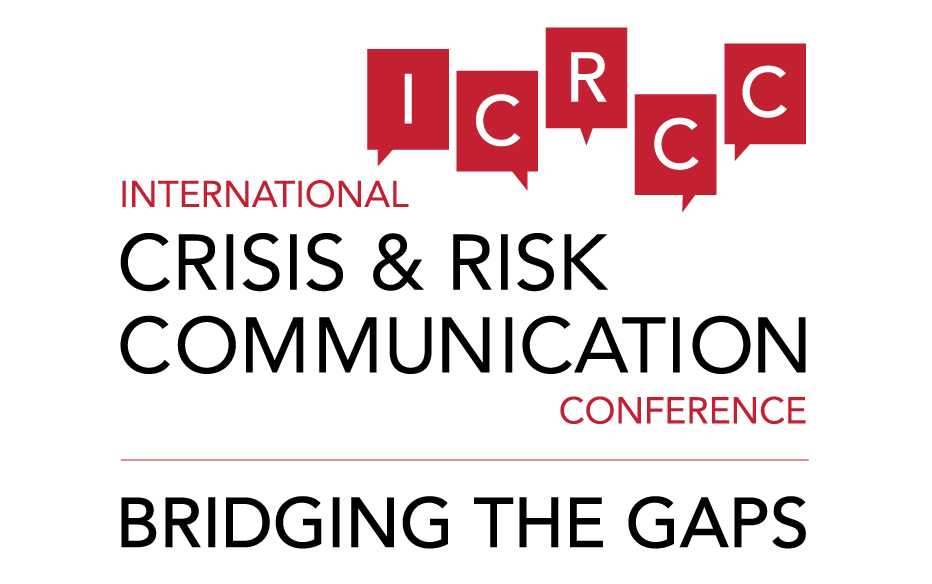2018 Post-Conference Materials
2018 Post-Conference Materials
Documents
Authors who would like to submit to the Proceedings of the International Crisis and Risk Communication Conference can download the proceedings template by clicking here.
To access the copyright agreement in relation to proceedings of the International Crisis and Risk Communication Conference, click here.
Presentations
Mark Benthien – Great ShakeOut Earthwuake Drills: A Collective Impact Approach for Whole Community Preparedness
Kjell Bratas – Cultural Challenges when Memorializing Tragedies
Jeff Conlin – Corporate “Street Cred” in Crises: Does Who You Are or What You Say Matter?
Rebecca Crapo – Preparing for the Apocalypse: Promoting Civic Engagement to Increase Preparedness for Nuclear Disasters
Ashleigh Day – Informational Sources and Media Uses: Examining Race, Ethnicity, and Culture in Flint’s Water Crisis
Audra Diers-Lawson – Donkey Kong vs Grand Theft Auto: Bringing and Open World Gaming Approach to Developing Risk and Crisis Simulations
Audra Diers-Lawson – Evaluating the State of Crisis Communication Research: A data-driven review of Crisis Communication Research from 1953-2016
Ermose Ebhuoma – Why Trivializing People’s Culture Can be Catastrophic for Communicating Weather Risk: Lessons from the Delta State in Nigeria
Anthony Eseke – Effects if Crisis New on Intercultural Tolerance
Amiso George – Culture Centered Corporate Apologia: A Review of Strategies Across Three Countries, Nigeria, India and USA
Marina Ghersetti – Do We Really Need to Know Everything? Crisis Communication Ethics Among Swedish Journalists and Citizens
Emily Hamlin – The Power of Language: Examining Arrival Through a Narrative Analysis
Suzanne Horsley – Analysis of the 2002 D.C. Sniper Case: Toward a Response Typology for Threats to Public Safety
Suzanne Horsley – The Ethics of an Oil Spill: An Analysis of JIC Statements After the Deepwater Horizon Explosion
Joel Iverson – Reviled Revival: Navigating the Tensions of Organizational Renewal in Hate Groups and other forms of Organizational Evil
Jin Xianlin – Communication Emerging from the Crisis Resolution Stage: Topic Modeling of Tweets about Hurricane Maria
Bengt Johansson – A Citizen Perspective On Crisis Communication – A Normative Approach
Jenna Jones – SeaWorld’s Sneaky Stunts: Investigating the Hidden Narrative in Blackfish
Wouter Jong – Defining Complexity In Public Meaning Making
Larry King – Social Media Use During Natural Disasters: An Analysis of Social Media Usage During Hurricanes Harvey and Irma
Martha Kuhnhenn – Bought Science vs. Fearmongering? The German Debate on Glyphosate in the Context of itʼs Reapproval in the European Union
Daniel Laufer – Incorporating digital simulations in Crisis Management courses around the world: Insights from over a decade of teaching
Brooke Liu – Telling the tale: The role of narrative persuasion in helping people respond to crises
Andrea Madrazo – The Hunt for Answers Remains
Amisha Mehta – Towards Message Effectiveness: The Role Of Efficacy-Based Content And Images In Bushfire And Flood Emergency Warnings
Amisha Mehta – Perspectives From The Trenches: How Australian Risk Communicators See Themselves, Who They Trust, And What They Need From Research
Kwansik Mun – A Close Look At The Of Regulatory Fit In Consumers’ Responses To Unethical Firms
Cayce Myers – The Value of Public Apologies in Crisis: Winning in a Court of Law or the Court of Public Opinion?
Cynthia Nnagboro – Pop Culture Portraying Pandemonium: Investigating Rule-Breaking Behavior In Contagion
Luz Maria Ortega – Differences in Risk Perception: A Typology for Risk Communication
Laura Pechta – The Effect of Organizational Communication Cultures on Interorganizational Collaboration in Crisis Response
Jeanne Persuit – Bridging the Culture Gap between Brand Perception and Crisis Preparedness: Reputation, Authenticity, and Crisis and Risk Communication
Mike Porter – Shield Bearer or Seasoned General
Kevin Quigley – Attitudes and Perceptions about Risk Resilience and Security in Water Utilities
Gabriella Sandstig – Should I stay or should I go? An analysis of risk communication and fire safety
Henry Seeger – Water as a crisis communication frame: Droughts, Floods, and Contamination
Elizabeth Spradley – Volunteerism in Hurricane Harvey: A narrative analysis of social media messages to coordinate, inspire, and activate faith-based volunteer responders
Tyler Spradley – FEMA level urban search and rescue response to Hurricane Harvey
Margaret Stewart – Implementing STREMII: A practical guide for crisis communication on social media during hurricanes and natural disasters
Margaret Stewart – Reputational Threats Online: Social media as a simultaneous agent of crisis and tool for response and resolution in the case study of an American academic library
John Sweeney – Strategic Adjustment–The NFL and the concussion crisis
Lakelyn Taylor – The Value of Instructional Communication during Chaos: Expanding Learning Style, Gender, and Group Implications
Matt Tidwell – Strong prior reputation: A help or a hindrance in reputational crises?
Paul Wilke – When Good Crisis Comms Go Bad and How to Prevent It
Paul Wilke – The Crisis Comms Shortlist – Your Need to Know Action Items For Every Situation
Cody Blake Wilson – Discourse Networks of Emergency Response Communication: A Case Study of Civilian Deliberation on the Reddit Platform
Cody Blake Wilson – Victim-group legitimacy: An argument for extending our understanding of legitimacy after crisis
Cory Young – The NFL as a Mega-Crisis: Applications of Fractal Crisis Theory
Photos


